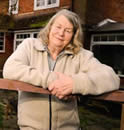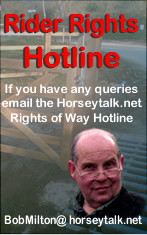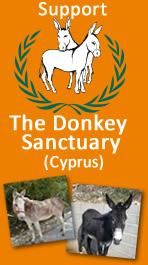
Horseytalk.net/Hoofbeat EXCLUSIVE
RIDER RIGHTS
Says Adrienne Yentis
 A friend of mine recently was riding on the heath
A friend of mine recently was riding on the heath
and she came across a group of cattle strung out across the bridlepath with no way through – the only way off was to turn round. Fortunately her horse
remained calm throughout. But you can imagine how a nervous horse might react ........... read more
Draft Regulation Bill
Maureen Comber writes to the Joint Committee
"There is one omission in the draft Bill which could make a huge difference to horse riders throughout the country, and that is an amendment to CROWA 2000 Schedule 2 sec.2 (1)c. Please will you add the word ‘equine’ so that it reads dog or equine?"
Says Maureen Comber
 I have been a Volunteer for The British Horse Society for over forty years specialising in Access and Rights of Way, so I am happy to pass on those parts of my experience which relate to the above, as evidence for your consideration.
I have been a Volunteer for The British Horse Society for over forty years specialising in Access and Rights of Way, so I am happy to pass on those parts of my experience which relate to the above, as evidence for your consideration.
There is one omission in the draft Bill which could make a huge difference to horse riders throughout the country, and that is an amendment to CROWA 2000 Schedule 2 sec.2 (1)c. Section 2(1) - does not entitle a person to be on any land if, in or on that land, he (c) has with him any animal other than a dog. Please will you add the word ‘equine’ so that it reads dog or equine? Horse riders feel disenfranchised from their use of the highways because of the speed, volume and size of vehicles, especially on the Tolkein like, narrow country lanes. This small alteration, the inclusion of the word ‘equine’, would redress what appears to have been an oversight when Crow 2000 was enacted. At the moment we hear of large grants awarded for cycling, while walkers gained ‘open access’ under CROW, so horse riders are feeling excluded if not discriminated against. In addition we are losing our grass roots from a lack of safe riding routes. It would therefore add considerable support to the equine industry which is estimated to be worth £7 billion per annum to the UK economy and to employ 220,000 – 270,000 people [BHS]; as well as inclusion for horse riders.
I agree with the proposals from GLEAM below. It took me forty years to get Cradle Lane (BOAT) repaired by the LHA, during which time it was far from pleasant to use, until 2005 when it could no longer be used at all, because extensive damage caused by 4WD and motor cycles had made it unacceptably dangerous. There then followed an excessive number of consecutive temporary TRO’s, illegally used by Hampshire County Council (HCC) over four years, preventing all use! It is now repaired, but instead of the promised permanent TRO banning MPV’s to match the nine temporary ones, as per the expectations of the statute, RTA 1984 sec 14/15 (3), HCC changed their minds at the last moment and decided they would permit motor bikes. Since this is a section of the Shipwrights Way for non motorised users, the decision was unfathomable! However those of us, who have had a long association with this Council, jokingly refer to it as being at The Castle, Westminster rather than Winchester, because they seem to be a law unto themselves!
In this respect I would ask you to consider whether they can be trusted to act impartially in the respect of rights of way claims?
This is because as mentioned above they have a lamentable inclination to do what they wish rather than what the law provides. It has taken me thirty years to catch up with their maladministration with regards to Broxhead Common, where it can be seen that they colluded with a landowner and illegally removed 80 acres of the common from the register for common land, for which they are the registration authority!! This was done by false representation, failure to disclose, failure to transfer information to the documentation accurately and by completely ignoring the statutes etc. etc.
In these circumstances you will understand why I have not much faith in the integrity of local government in this respect?
I strongly support the request of the Green Lanes Environmental Action Movement which is set out below. My reason is that as I researched the history of Cradle Lane I discovered that once again Hampshire County Council had incorrectly upgraded it from its original status as a bridleway, to a Road Used as a Public Path (RUPP) and then in 1987 under WCA 1981 to a BOAT.
They had ignored the letter from the Head of Countryside, DOE, and upgraded the many RUPP’s in East Hampshire to BOAT en bloc, without researching to see if they qualified by having 20 years of vehicular use before 1930. They wrongly assumed that if there was a wheel mark it must be a BOAT. This has caused misery to very many people who would have liked to enjoy these ancient paths but could not, because of the severe damage inflicted by motorists, which eventually turned into to the sport of ‘mudplugging’, as it has come to be known.
This is in total contrast to the importance the public give to the policy of protecting the countryside and sustainable transport etc. Hopefully the suggestion by GLEAM, would put this matter right once and for all. I would just make the point that this would not be excluding anyone, as all could enjoy a more peaceful environment without the damage, by leaving a vehicle in the nearest car park, while at the same time it would encourage more healthy, active, pollution free, lifestyles.
Gleam invite the Government to use the Deregulation Bill to close loopholes in rights of ways legislation beyond those already addressed in Clauses 12 - 18. These defects remain following the enactment of the Countryside and Rights of Way Act 2000 (CROWA) and the Natural Environment and Rural Communities Act 2006 (NERCA). The loopholes now identified have resulted in extensive further damage to unsealed Byways Open to All Traffic (BOATs) and unsealed unclassified county roads (UUCRs) by recreational off-road motor vehicles.
1. GLEAM draws attention to the fact that there is no right of appeal against inaction or unreasonable refusal by highway authorities in respect of requests for Traffic Regulation Orders (TROs) under the Road Traffic Regulation Act 1984 (RTRA). This is inconsistent with there being rights of appeal in virtually every other field of rights of way management including public path orders, obstruction and repair notices, and even rights of way determinations. I would like to agree with the GLEAM proposals that there should be an amendment to the RTRA introducing similar rights. This would conveniently dovetail with Clauses 15 - 17 of the Draft Bill which seek to amend the Highways Act 1980 as to applications for public path orders.
2. Existing rights of appeal may be to the Secretary of State or to magistrates. It is proposed in the interests of minimising regulation that TRO appeals should be to magistrates. That would have the advantage of dealing also with costs in a conventional manner.
Reasons
3. Section 130 of the Highways Act reads: "(1) It is the duty of the highway authority to assert and protect the rights of the public to the use and enjoyment of any highway for which they are the highway authority, including any roadside waste which forms part of it." That is frequently interpreted as asserting the rights of all users, even though the use by a small minority may result in damage which prevents the use and enjoyment by the majority. GLEAM has received countless complaints about green lanes being damaged by motor vehicles, to the extent of making walking or cycling impossible, and of rutting which presents a risk putting use by horses out of the question. Occasions of actual injury have been reported, as have cases of horses being 'spooked' by fast-moving motor vehicles - even to the point of causing fatal injuries to riders.
4. Highway authorities have a parallel duty not only to repair rights of way, but also to spend taxpayers' money in a responsible way. A badly-damaged BOAT or UCR can cost up to £75,000 per mile to repair. Damage to public paths is not only a criminal offence in itself (a factor normally overlooked by highway authorities) but is also one of the express grounds for imposing a TRO. Regrettably, authorities commonly adopt a policy of waiting for damage to occur before even considering making a TRO. It is factors such as these which offer such a compelling case for a right of appeal.
5. Failure by an authority to carry out its repair obligations is covered by Sections 56 - 58 of the Act. There are appeal rights to the magistrates' court, including the matter of costs.
6. Damage which impairs the use and enjoyment of highways by others is in effect an obstruction. Sections 130A-D of the Act deal with notices under this heading and also with appeal to the magistrates' court, including the matter of costs. There is no apparent reason why no right of appeal exists in respect of TROs. Rectifying this defect would fit squarely within the proposals under Clauses 15 - 17 of the Deregulation Bill. Drafting such a measure would be straightforward, as use could be made of the existing legislation referred to above
7. On balance the proposal will reduce bureaucracy for the same reason as is given in paragraph 81 of the Notes to the Bill. This states regarding applications for gating orders: "This measure will make it easier for owners to obtain permission to erect gates on byways. It is thought that it will also have the effect of reducing the number of occasions on which applications for an order modifying a definitive map and statement to show a byway are opposed by landowners." It is the experience of GLEAM that in a large number of cases objections to modification orders are accompanied by complaints at the lack of TROs, or requests for the making of TROs, as part of the objections and submissions. Doubtless the Planning Inspectorate will be able to confirm this important point.
8. GLEAM particularly wishes to support PDGLA in its battle against off-roading in the Peak District. Improvements to the TRO system would offer a major step in that direction.
Government policy
9. In December 2003, the then Minister for Rural Affairs (Alun Michael) said: As Rural Affairs Minister, I have been approached by many individuals and organisations who are deeply concerned about problems caused by the use of mechanically propelled vehicles on rights of way and in the wider countryside. I share these concerns, having seen for myself examples of damage to fragile tracks and other aspects of our natural and cultural heritage in various areas of the country. There is considerable concern about behaviour that causes distress to others seeking quiet enjoyment of the countryside ....
I do not think that it makes sense that historic evidence of use by horse drawn vehicles or dedications for vehicular use at a time before the internal combustion engine existed can give rise to rights to use modern mechanically propelled vehicles. Those who suffer from vehicle misuse find this incomprehensible and in this paper we offer new proposals that are intended to address what many have come to view as the inappropriate and unsustainable way in which vehicular rights are acquired and claimed on rights of way."
10. That statement of policy was the introduction to what became the Natural Environment and Rural Communities Act 2006. Giving a right of appeal to citizens on TROs is entirely in accord with the Government's policy as to the countryside, as well as with its policy on localism. By bringing focus to authorities' implementation of TRO law, there would probably be a nil net effect in the regulation balance. Undoubtedly it would lead to substantial savings in public expenditure, given that the cost of applying a TRO is very substantially less than the cost of repair brought about by the failure to take effective measures to prevent damage. 11. For these reasons GLEAM urges the Government to use the Deregulation Bill to introduce the right of appeal into TRO legislation to protect unsealed BOATs and UUCRs from further damage by recreational off-road motor vehicles.
I hope you will feel able to support these suggestions? It will enable many more non-motorised users to enjoy an amenity that was actually meant for them, but was hi-jacked by a relatively small number of mudpluggers. It has taken decades to deal with the situation legislatively speaking, despite the overwhelming public support for the protection of the countryside. It is also entirely in line with all the sustainable transport and living policies in place to protect the environment, and the promotion of healthy active lifestyles.
 Says Linda Wright
Says Linda Wright
We moved to a Shropshire location a year ago having surveyed the local OS map and noted the significant number of bridleways around the property. Sadly the map appears a total fiction. Scarce any of the bridleways are usable ........... read more









